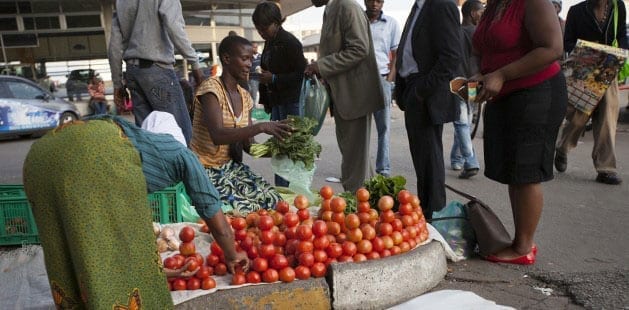The government in Zimbabwe is moving to ban market vendors in Harare at a time when more than 90 percent of the workforce labors in the informal economy and 85 percent or more Zimbabweans are seeking decent work.

Zimbabweans are struggling for their fundamental right to earn a living. Credit: Thando Khoza
“People who are into street vending are not into it for their liking, but are being forced due to the collapsed economy,” the Zimbabwe Congress of Trade Unions (ZCTU) says in a statement.
“Instead of harassing vendors, the government must first of all restore economic growth and create the promised 2.2 million jobs. By doing so, all vendors will vanish overnight,” says ZCTU.
The Zimbabwe Chamber of Informal Economy Associations (ZCIEA), which represents some 200,000 members, has been seeking to address challenges identified by government and business in negotiations with the Harare central business district since January, and urges that “Operation Restore Order” ordered by the Harare City Council acting town clerk not be implemented.
“The laws and regulations which govern the informal economy are very much outdated and informal economy traders are always criminalized or termed illegal,” ZCIEA says in a statement. ZCIEA says the government’s designated vending sites are not accessible to customers because of their distance, and urges continued discussion among vendors and central business district representatives.
Since 2011, more than 6,000 companies have closed, leaving hundreds of thousands without employment. Even those with formal economy jobs are not paid on time, according to the Solidarity Center report, “Working Without Pay: Wage Theft in Zimbabwe.”

Zimbabwe street vendors also were targeted with eviction in 2016 and protested the move in Harare. Credit: Solidarity Center
Many people have turned to street vending after losing their jobs, and the 2.2 million market vendors now generate an average $3.96 billion in annual revenue. The number of market vendors also has increased because people are struggling to get by following a recent sharp hike in prices for basic goods.
The government waged a similar crackdown on market vendors in 2015, tearing down market stands and forcing vendors to pay high fees to set up stalls at government-approved sites.

